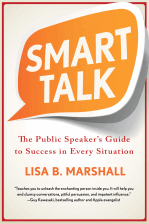Are You Making These Common Communication Mistakes?
Throughout the course of your day, you may interact with many people who are not native English speakers. Whether you have trouble conversing with colleagues or neighbors who aren’t native English speakers or simply would like to enhance your conversations, the Public Speaker, Lisa B. Marshall, offers these 10 tips for better ESL conversations.
Sponsor: Want to save more, invest for the future, but don’t have time to be a full-on investor? Betterment.com helps you build a customized, low-cost portfolio that suits your goals. Learn more.

Here are 10 questions to ask yourself when holding conversations with people who speak English as their second language. They’re accompanied by powerful tips that will help you avoid making some very common communications mistakes.
1. Are You Impatient?
When people make an effort to speak your language, give them the opportunity to put their sentences together. Don’t cut them off. Let them finish their thoughts. If you say something and it appears your listener didn’t understand, it’s OK to repeat your statement again using other words. Also keep in mind that talking louder or yelling at a person doesn’t enhance that person’s ability to understand you. Bonus tip — Smiling can go a long way for both of you!
2. Are You Disrespectful?
Give credit to non-native speakers for making this effort and show them respect by listening as carefully as you can. Make sure your body language and posture are sending positive signals, not negative or “shut-down” vibes. Always give your full attention to your conversation partner and listen carefully before you form your response. Be aware and respectful of cultural differences regarding touching, eye contact, and personal space.
3. Are You Discouraging?
Give them verbal cues that you understand as they are speaking; don’t be discouraging in your stance or gestures. For example, saying “Ah, yes,” and nodding your head lets your listener know he or she is being understood. Be sure not to cover your mouth — lip reading is a skill often used when a person is working to decipher the pronunciation of new or unfamiliar words.
4. Are You Being Too Picky?
If you don’t understand a particular word, let it go unless it is absolutely critical to the communication. 
5. Are You Blaming Them?
If you really need to ask your conversation partner to repeat something because you did not understand it, simply say, “I’m sorry, can you repeat that? I didn’t understand that last word.” If, on the second try, you still don’t understand, say “I’m sorry, can you try using a different word? I’m still having trouble.” Notice the idea is for you to take the blame. Don’t say something like, “Your accent is too heavy” or “You are speaking too quickly.”
6. Are You Using Complex Language?
Choose simple, common words to communicate and keep the structure of your sentences simple. With this in mind, you should still try to communicate as naturally as possible. Sometimes, when speaking to children or people who speak another language, we make the mistake of sounding choppy. Don’t be robotic, just slow down and keep it simple. Don’t mumble! If it seems as if the person you are talking to does not understand, try using different words to say the same thing. To be clear, I’m not suggesting you simplify the message, only that you choose more common vocabulary. Also, if you can, use your hands and arms to help get your message across.
7. Are You Being Annoying?
When asked to repeat something, repeat using the same words you used the first time. But then repeat the ideas again using different words. I was recently speaking with someone whose primary language is French. And, although she speaks English very clearly, there are some words she doesn’t use in day-to-day conversation. For example, I was telling her that I was upset about something. After realizing what I truly was trying to convey, I changed my wording from “upset” to “sad.” Also keep in mind that accents can be a significant barrier to comprehension. If you suspect this is the case, try pronouncing the misunderstood word as the non-native speaker does. Finally, when you repeat something, be sure to repeat the entire sentence. This will help put the word into its proper context and avoid confusion.
8. Are Your Frequently Using Idioms?
We use idiomatic phrases automatically, but they may not mean anything to ESL speakers. “This assignment will be a piece of cake.” Or, “This sweater cost me an arm and a leg.” Statements like these will need further explaining. My advice — try not to use them. Instead, try to use more common words to describe something without confusing your conversation partner.
9, Are You Using Slang or Filler Words?
This is another confusing area of any language and can be very specific to a region or profession. Think about the sentence “Disco music is so cheesy.” If English isn’t your primary language, you’re going to translate this literally and, thus, dramatically alter its intended meaning. You may need to find another adjective/noun if you slip in some slang. Again, if you do use any slang, be sure to explain it. Finally, be careful to avoid verbal viruses such as um and ah because your listener may think these are real words and get stuck trying to interpret them.
10. Are You Slurring Your Speech?
You know how, as a native English speaker learning a new language, it seems that people fluent in that language sound like they are speaking so quickly? Well, the reverse is true, too! To ESL listeners, English speakers sound like we are speaking too fast. With that in mind, don’t let your words run together. The more clearly you can communicate them, the better. Similarly, it’s helpful if you don’t use contractions. Remember, slow down and don’t run your words together! Speaking this way can make whatever you’re saying impossible to understand for a non-native speaker of English.
In general, if you notice a mistake just let it go. However, if you feel compelled to correct the person, it is important to first ask if he or she would like a correction. Don’t assume. If you heard many mistakes, just focus on the mistake that, if corrected, would be most helpful.
The most important thing to remember when communicating with someone from another culture who speaks a different primary language is that our differences are what make us unique. Your life will be richer and more fulfilling by taking the time to understand someone who comes from a different background. Communicating clearly with everyone we interact with fulfills a basic need for all of us. Enjoy speaking with everyone you meet, and look for more opportunities to share your world with others.

If you want even more success in your life, I invite you to listen to my other podcast, Smart Talk: Inspiring Conversations with Exceptional People.
ESL Chalkboard and Two Women Conversing images courtesy of Shutterstock
Betterment LLC is an SEC Registered Investment Advisor. Brokerage services are offered by Betterment Securities, an SEC registered broker-dealer and member FINRA/SIPC. Investments are not FDIC Insured. No Bank Guarantee. May Lose Value. Investing in securities involves risks, and there is always the potential of losing money when you invest in securities. Before investing, consider your investment objectives and Betterment’s charges and expenses. Not an offer, solicitation of an offer, or advice to buy or sell securities in jurisdictions where Betterment and Betterment Securities are not registered.
You May Also Like…






